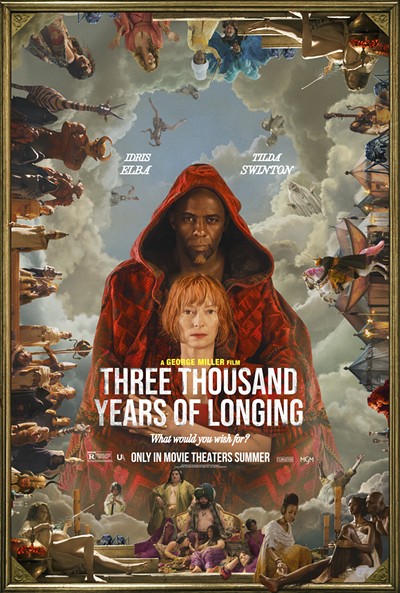
The ironic conceit that romance is deepened by the threat of its end is an old one, and George Miller grabs it by the hilt. Last seen helming Mad Max: Fury Road (and seemingly getting a blank check here for it), Miller's latest swims through millennia as recounted by a Djinn on love and loss amid a filmic world that mashes myth and folklore with more familiar historical details. Conjuring an anything-goes atmosphere from a mess of references, abrupt turns, flashes of brilliance, and received biases, Three Thousand Years of Longing works its frame narrative and nested palace-intrigue trappings into a structure that allows it to marvel across them at the rewards and requirements of romance over the duration of any person's life. The film feels steadier for privileging this fixation, the romantic themes at its center girding (and sometimes making up for) what surrounds them. In both its sincerity and its flashes of communicative inattention, the film proves evocative, angular, and ultimately winning even as it knowingly plies old tropes.
Opening on Tilda Swinton's Alithea Binnie, a prominent, London-residing narratologist (she studies stories) giving a conference talk in Istanbul, Miller positions her from the jump as a distant, even repressed analyst of the tales she makes her subject. Teaching stories which once held intimate, guiding resonances for those who first shared and later repeated them, Binnie describes mythological systems to packed rooms in ways that feel largely explanatory and matter-of-fact, drained of either mystery or emotional investment. Though Swinton remains gripping (and increasingly open, lately) as a screen presence, the film positions Alithea as a dowdy outsider, working to impose control over her life with a certain firmness — and in so resisting the constant churn of the modern world around her. But she resists, too, through ardent dismissal, real-seeming visions of folkloric entities which pepper her experience of daily life. Soon after one such frightening episode, in one scene at a souvenir shop that recalls another like it in David Lean's Summertime, she finds a bottle and potential artifact she elects to take home with her. The "visiting collector" dynamics here are plainly colonial in resonance — on which more later — but it's something the film works with for the most part knowingly, if not always with great sense.
Once back within the confines of her hotel room, Alithea's joined by a massive, powerful Djinn (Idris Elba), a powerful spirit who springs from the bottle and insists on granting her three genuine wishes in order to set himself free from his longtime prison. The interlocking power dynamics in play provide the film with its foundation (Can another person's "wish" be demanded from them? Who is holding who captive here? Etc.), a structure and set of questions upon which a steady procession of flashbacks and eventually plot architecture is erected. In the interest of getting to know each other, and perhaps to gain a rhetorical upper hand, the two begin recounting tales of what's mattered to them most: chiefly the romances that have colored their respective pasts.
For Elba's Djinn, dalliances have taken place with a succession of women, each separated by centuries. Once cursed by the new groom of Sheba, his onetime lover, his life since has taken on a cyclical, naturally existential rhythm of confinement (one might say repression) and freedom (or release). Swinton's sharp but mannered Alithea finds herself in a similar, more compressed lull commensurate with her mortal life; since her divorce some long while back, she's worked to be happy alone. For hours over a long day, the two swap tales, each rendered in flashback via vividly colored combinations of practical and computer-based effects work. Weaving gods, warfare, and more modest folklore all together in spaces which seem to echo one another for their focus on the contradictions of possessive romance, the film's tales are riddled with purchased brides and concubines (features of the latest Mad Max, too, and of plenty more dystopias besides).
While reflecting some credible measure of orientalizing tendency on Miller's behalf (the Australian filmmaker is now 77, and treats his Middle Eastern settings as vaguely primitive, erotically free, and rich in mystery), these recurring motifs don't just stir questions of taste or politics — they provide a field for inquiry into the film's themes. In offering the women and girls who find him wishes, Elba's Djinn labors to free them not only from the hours or obstacles that separate them from their desires but from the enduring patriarchal structures which respectively surround them. At the same time, he's a prisoner of their desires both expressed and withheld, whether erotic or platonic, subject despite his own powers to their respective whims. Amid each relationship swirl the tensions between pain, power, openness, and the costs of vulnerability — forces which persist into the present.
For Alithea, who retains control over her situation with the Djinn (if not a clear sense of direction over what to do with it), these stories all inform her choices and feelings at present. Whether warily mulling the question of whether Elba's figure could be a "trickster Djinn" (an old trope) or contemplating how much of her own story to reveal, her story becomes a part of the sweep of history the Djinn conjures up for her. Working from this sense of scale, Miller works to get at the enormity and consequence of romantic feeling, brushing aside concerns over fact and fiction, and truth and lies, in favor of the emotionally true.
This tendency continues into the film's last act back in London — a sequence which becomes, through bent rules, temporal ellipses, and perplexing implications, haphazard to the point of endangering the film. As the film's previously refreshing cartoon logics seem to ossify and break, with the world around the two lead characters seeming to crumble away from both us and them, the ruptures in logic allow something to be glimpsed through them: the endurance of Miller's central concerns. As in the work of old peers from David Cronenberg to Clint Eastwood to Claire Denis, a director's inattention can be as expressive and revealing as portions of their films more labored-over and refined. For Miller, here his chief concerns provide the film a sturdy, lively center: one that exerts a force so strong that by its finish little else seems to count.
Film Details
Stay connected with Detroit Metro Times. Subscribe to our newsletters, and follow us on Google News, Apple News, Twitter, Facebook, Instagram, Reddit, or TikTok.






